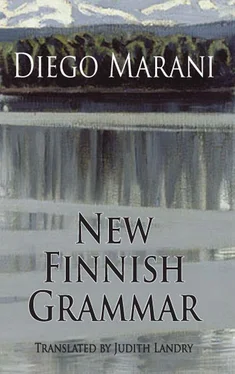We both looked behind us at the dark mass of the city, then turned towards the white expanse of sea.
‘Does that mean there will be no more snow?’ I asked.
‘It will rain. A lot. Everything will turn to mud.’
‘But the trees will come into leaf.’
‘That takes time. Here, spring is the worst season. The earth and sky soak up the mud churned up by all the rain; even the seagulls get spattered with it when they come to peck at rubbish in the puddles. Everything that has died in winter goes bad only in spring, because the ice keeps it alive for months. You’ll see, there will be a smell of rotten wood, dead animals and stagnant water, all coming from the woods. It’s like that on battlefields: it’s only now that many mothers will weep; only now will the earth be soft enough for digging graves. That is another thing the summer does: it frees us from the dead.’
In front of us the ice was creaking, the trees were dripping and the clouds breaking up in the darkness of the sky, swept by a gale that we down here could hardly hear. Ilma fell silent, let go of my arm and turned towards the open sea. Now I could smell her hair: it smelled of smoke and lacquer; it smelled of life. I felt an urge to take her by the shoulders, to take her in my arms, to hold that being made as I was made. But something held me back: each of us was locked into an equal solitude, lonely conditions which touched one another but did not blend, like two drops of different liquids. We carried on walking around the bay, towards the hill in Kaivopuisto Park; a shapeless bit of moon had emerged from a strip of cloud piled up on the horizon, its glancing light gashing the countryside like machine-gun fire. Shadows dense as pitch danced down from the trees on to the walls of the buildings, carving dark, unsettling fissures in the snow. The houses thinned out as we approached the hill; Ilma was walking a few steps ahead of me, as though she were in a hurry to reach her goal.
‘I want to show you a secret,’ she said.
She walked quickly up the slope, turning around every now and again. I could hear her breath, and the splashing sound our steps made in the wet snow; from time to time the wind would send a lock of our hair flying over our faces like a long scratch. I was having trouble keeping up with her, and would stop every so often to draw breath. I sensed, from her enthusiasm and her determined step, that she had something specific in mind. She stopped in the middle of a field of untouched snow, on the brow of a downward slope running towards a little cobbled lane.
‘Here we are!’ she exclaimed breathlessly, pointing towards a great tree, gnarled and bare, which forked into two almost at its base, one branch running immediately upwards, the other running horizontal to the ground for several feet before doing the same, so as to form a seat. Ilma went to sit on it, brushing the remains of the snow from its smooth bark, and casting a shadow which looked alarmingly like that of some prehistoric animal.
‘This is the magic tree — the tree of happy memories! It’s here that I hang all the good things that have happened to me in this city. Of course, it’s more impressive when it’s in leaf — summer evenings are the time to come here, when the light is red and the air taut as a sail. That’s when it casts its spell. Would you like me to tell you how it works?’
I nodded, and went to sit beside her on the seat.
‘Whenever I meet someone I get on well with, I bring them here, talk to them here, let the tree take in something of our memories, and the magic starts to work. Then each time I come here that memory will return: that moment, that person are mine for ever, here, inside the magic tree!’
‘Do you have memory trees everywhere you go?’
‘No, only here.’
‘Why only here?’
‘Because in this life you have a right to just one memory tree. Otherwise, it would be too easy, people would just rush from one tree to the next so that nothing would ever be forgotten, so that nothing of one’s own memories would be left lying around. Then nothing would be forgotten, and memories would cease to exist.’
‘But without memories there would be no nostalgia, either,’ I objected.
‘That’s true. So how would people carry on living? After all, we live in hope that a memory will come back — that it will prove to be a premonition.’
A prolonged silence followed. I listened to the wind as it whistled through the branches; I wished that they could speak instead of me, for I had nothing more to say. But rather than keeping silent, I persisted:
‘And why would you want to remember me?’
It gave me a certain painful pleasure to say these words; nor did I try to soften their meaning with my tone of voice. Amidst the throng of rowdy thoughts that had surged through my mind during that night, I recognized the face of my own solitude: it was my damnation and my raison d’être. It was calling me now; I had to go. Ilma bowed her head; she knew what I was thinking.
‘So that this night may be remembered, so that it won’t fall into the dark pit of everything that’s past,’ she answered bitterly.
‘So you hope that this night will come back? That it will be a premonition of something else?’
My question was badly formulated, put together in haste without the words being properly sewn together. Ilma had to think for a moment before she understood what I meant.
‘I don’t know yet. I haven’t got the heart to hope for anything. I’m making do with storing up things to hope for! Time will tell me which to continue hoping for and which to set aside,’ she replied at last, still forcing her mouth into a smile, but it was a ghost of what had gone before.
I didn’t understand her answer, but I didn’t ask for explanations; they no longer held any interest for me. Ilma was silent for a moment; she was breathing hard, perhaps holding back tears.
‘Don’t you have any hopes at all? Is there nothing that you wish for?’ she managed to ask again, though she was clearly having difficulty getting the words out.
‘Yes, there is: I hope to find some memory of me in someone else; I hope to find someone who can tell me about even one single day in my past life: about one summer’s afternoon when I was a child, some outing, what games I played. Because surely I too must have run around a courtyard kicking a ball?’
I had spoken emphatically, almost angrily; but my tirade vanished into the unresponsive darkness as though I had not spoken.
‘But perhaps I’m wrong,’ I went on bitterly. ‘Perhaps that’s not what I should be looking for.’
‘Tomorrow this will already be a memory, a small seed pearl,’ said Ilma after a long sigh. I was rejecting her and still she was trying to comfort me.
‘To keep a memory, you have to have somewhere to store it,’ I shot back tersely.
‘You can glue it into your album of memories along with the Porilaisten marssi . Night with Ilma, you could call it.’
Her forced smile irritated me.
‘I have no memory, I have no past. My souvenir album ends practically before it has begun,’ I protested.
‘Who cares about the beginning of a fairy story? It’s hearing the end that keeps children awake till all hours, with the book hidden under the covers, curled up in the candlelight, shivering with fear at the weird noises all houses make at night.’
A falsely cheerful note had crept into her voice; it rang out firmly, then trailed off suddenly into silence. She had responded to my every remark with the most persuasive words that she could muster, whereas I had flung the most cruel that I could marshal back in her face. With her silence, she seemed to be asking me why. Then we both stopped talking: nothing, we felt, could fill the gap that had opened up between us, however small: we would bear it within us always, until the end of time. Because of those few fateful moments, our feelings would never weigh equally upon the scales: there would always be something left over, some unspendable small change. I had sought her affections, I had let her run towards me, then I had rejected her. For no reason: just for the subtle pleasure of disappointing her and proving to myself that any attempt at breaking out of my solitude was vain. I was enjoying my suffering: by fooling myself that I was fighting it, I was putting it to some purpose. My lost memory had become my excuse for giving up on life. Now, in the moonlight, each could have seen the other’s face; but both of us were looking straight ahead. As in the bay below us, ice had had once more closed in upon me.
Читать дальше












